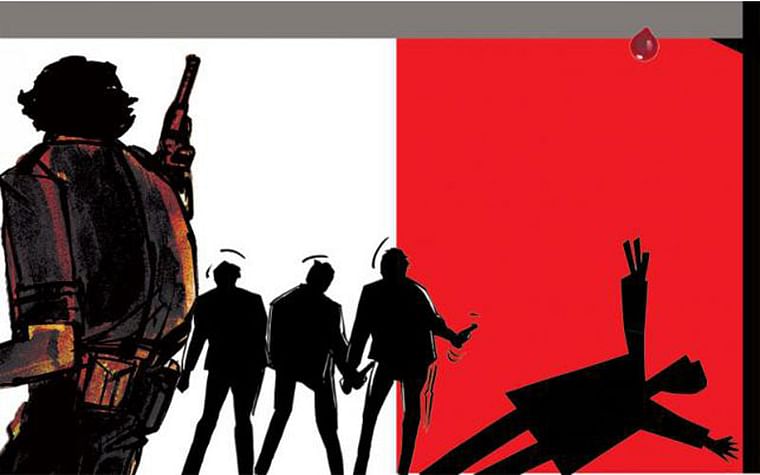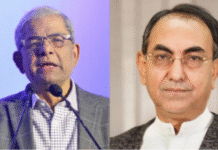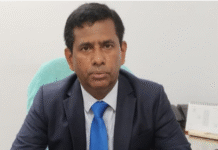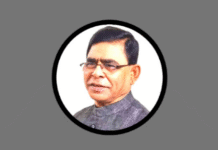
Members of the Rapid Action Battalion (RAB) were involved in the killing of 26-year-old Nur Alam Babu, the only son of the wounded freedom fighter Akkas Ali, 11 years ago. He was killed in a so-called gunfight. The home ministry’s inquiry committee revealed this the year after the incident took place.
The ministry issued directives to the police to file charges immediately against the eight RAB members who were involved in the killing. Till date the directives have not been carried out.
Meanwhile, the 71.year-old Akkas Ali spends his days at the freedom fighter’s rehabilitation complex in the capital city, hoping that one day he will receive justice for the killing of his son. He has carefully preserved the investigation report, along with the names of the accused, in his steel cabinet.
Every citizen is has the right to resort to the law, according to the constitution of Bangladesh. However, there is hardly a single example of grieving families receiving justice after losing their loved ones in extrajudicial killings. They face all sorts of obstacles in seeking justice.
After coming to power in 2009, the Awami League government declared that ‘crossfire’ would be ended. That has not happened.
Prothom Alo has investigated 7 incidents of so-called crossfire in which 9 persons were killed. The families of the deceased have sought justice from the police, the courts and National Human Rights Commission, but to no avail. In the meantime, RAB or the police have failed to establish the veracity of their gunfight narratives.
The police did not file any of the charges brought forth by the victims’ families in these 7 incidents. One complaint was made at the court, after which 11 agencies investigated the case for 11 years. The final reports of all the investigations acquitted RAB of all charges.
A judicial inquiry into another incident led to the arrest of 11 policemen. The member of victim’s family who was overseeing the case, was killed in the same manner 12 years later.
The families of the victims approached the National Human Rights Commission, but still received no justice. Upon recommendations of the commission, the home ministry investigated two cases, including the one pertaining to the death of freedom fighter Akkas’ son. Investigations proved the claims of gunfights or crossfire to be false. But the state took no action.
Meanwhile, RAB and the police have filed several cases in the 7 incidents, claiming gunfights in some instances and, in some instances, claiming crossfire between two criminals groups. But investigations have failed to identify any criminal groups. The cases end with the final report.
When any gunfight takes place, police regulations call for a full fledged official investigation to verify whether the use of firearms had been justified and in keeping with the rules. These investigations took place in all the cases, but there was nothing outside of the versions given by RAB and the police.
Each and every government of Bangladesh have accepted extrajudicial killing in the name of bringing crime under control. There are innumerable allegations of persons accused of criminals activities including drug dealing, rape and so on, being picked up and killed in ‘crossfire’ or ‘gunfights’. There are also allegations that members of the law enforcement carry out such extrajudicial killings in personal or political interests too. In 2014, allegations were proven in court that 17 RAB members in Narayanganj, on hire, had abducted and killed seven persons.
We do not agree with the word crossfire. NGOs use this term
According to Odhikar, 333 people were killed extrajudicially by the law enforcement in 2007-2008 under the military-backed caretaker government. The human rights organisation’s records show 2,470 lost their lives in extrajudicial killing from 2009 till June this year. The records of another human rights organisation, Ain O Salish Kendra (ASK), put this number at 2,525.
In its manifesto for the 2008 election, Awami League had pledged to end extrajudicial killing. After coming to power, in February 2009 the government claimed at the UN Human Rights Council that it had ‘zero tolerance’ against such killings.
In June that year, three organisations including ASK filed a writ with the High Court, calling for a halt to extrajudicial killings. The hearing of another such writ filed in 2006 remains pending. And extrajudicial killings continue, undeterred.
Home minister Asaduzzaman Khan told Prothom Alo in Friday, “I don’t see any crossfire. The law enforcement agencies open fire to defend themselves when attacked. The criminals are all trigger-happy.”
Former inspector general of police (IGP) Nurul Huda said the home ministry fixes the policy to be followed by the police. The ministry is impacted by politics. That is why the matter of extrajudicial killing must be seen from this angle. Speaking to Prothom Alo, he said, “Extrajudicial killing has become a part of our culture. The government cannot condone anything illegal. Law and order issues must be settled legally. No matter how long it takes, that is the only solution.”
It has been 28 days since Sinha was killed. No reports of crossfire in the country have appeared since then.
‘Staged drama’
Freedom fighter Akkas Ali’s son ran a tea stall. His bullet-ridden body was found on 15 May 2009 in Sabujbagh of the capital city. The body of Salahuddin Sohel, president of Mirpur Ward 7 Prajanma League, was lying next to his.
According to RAB-3, both of them were criminals. They died in a gunfight with RAB on patrol the night before. But the home ministry’s inquiry committee’s report on 2010 said that the incident was a ‘staged drama.’ The two killed persons were of upright character and not involved in criminal activities. They were ‘picked up’ by RAB member on the day before the incident. They were not killed in an ‘encounter’, but in ‘same side’ firing.
The inquiry committee had comprised deputy secretary of the home ministry at the time, Kamrun Nahar Khanam, deputy commissioner of Dhaka Metropolitan Police Md Sayedur Rahman and additional executive director of the human rights organisation Human Rights Review Society, Mirza Ashraful Islam. The inquiry report further said that two members of RAB-3 must be brought under the law in order to find the persons actually involved in this ‘inhuman and brutal’ incident. These two were leader of the patrolling team DAD Md Zakir Hossain and the officer who carried out the operation and issued orders to fire, company commander Major Mustafizur Rahman.
Why did the police not take action in accordance to the ministry’s directives? Spokesperson of the police headquarters, assistant inspector general (media and public relations) Sohel Rana, told this correspondent he would apprise him of the matter after he received a reply from the concerned office.
Ends with inquiry
The body of model and actor Kaiser Mahmud was recovered on 9 October 2009 from East Rampura Bazar in the city. RAB-1 filed a case with the Rampura police station.
The case stated that ‘Kaiser Mahmud Bappi’ had held a meeting with around 10 of his associates about carrying out criminal activities with huge amounts of arms and explosives. RAB members went there upon receiving secret information. The criminals opened fire on them and they fired back in defence. Afterwards they found Kaiser’s body lying there.
According to the charges, the RAB-1 team was led by assistant superintendent of police Sarker Omar Faruk. He was accompanied by 9 others. Their names are included in the case statement. Investigating the case the following year, an inquiry committee of the home ministry said that Kaiser Mahmud lost his life in ‘crossfire’ due to incorrect information given by the RAB informant. There was no case against him. There were criminal allegations against Kamrul Islam. He and Kaiser both had the same nickname ‘Bappi’. RAB killed the wrong person in ‘crossfire’.
Md Manzurul Alam, brother-in-law of the killed actor, told Prothom Alo that there had been no case against the actor when he was alive. Only after he died, a criminal case was filed with the Rampura station against ‘Kaiser Mahmud alias Kamruzzaman alias Bappi alias Miah bhai.’ Manzurul said that after seeing the investigation report in the newspapers, they went to the chairman of the National Human Rights Commission at the time, Mizanur Rahman. Mizanur Rahman said the commission would file a case, but it did not.
Mizanur Rahman now says he cannot remember why no case was filed. And the commission’s public relations officer Farhana Sayeed told Prothom Alo that the computer with records of that time was damaged.
Lawyer Shahdeen Malik said that extrajudicial killing was being carried out year after year with direct approval of the government. But in all countries, the truth of these incidents comes to light and legal proceedings commence. He said, these proceeding have commenced with the killing of Sinha by police in Teknaf. Gradually more incidents will come to light.
Compromise and crossfire
The body of fertiliser trader Ansar Ali (35) was found on 26 July 2008 in the Kakian forest of Shingra, Natore. According to the police, he died in crossfire. Ansar Ali’s father Rajab Ali filed charges with the court against 23 persons including 14 members of the police. Judicial inquiries reveal no crossfire took place. Ansar Ali was killed in a planned manner and then the story was made up.
The investigations accused 12 members of the police including the Shingra police station officer-in-charge (OC) at the time, Abu Bakar Siddiq, and 7 of their associates. Eleven of the police and the others surrendered in court and were sent to jail.
Later, however, the case took a dramatic turn. Rajab Ali told Prothom Alo that he came to an understanding with the accused, at the request of influential persons in the area. During the hearing, the witnesses gave their statements in keeping with this compromise. In 2015 the accused were released.
Then on 7 August 2009, the bullet-ridden body of Ansar Ali’s brother Afzal Hossain (45) was found near the Bhabanipur Bazar in Sherpur, Bogura. District police said he was the regional leader of the banned outfit, Purbo Bangla Sarbahara Party. They said he was killed in a gunfight of this extremist group.
Afzal’s son Enamul Huq filed a case with the Shingra subordinate court, saying that a day before the incident, group of persons, identifying themselves as detective branch (DB) police, had picked up his father in a black microbus from a placed called Bandar along the Natore-Bogura highway. Afzal’s father Rajab Ali, speaking to Prothom Alo, said, Afzal would look after the case about his brother’s death. Now they were being threatened n various ways for filing a case about Afzal’s death. They are too scared to stay at home. Under court order, the police’s Criminal Investigation Department (CID) is investigating the Afzal killing case. Natore CID inspector Aminul Islam told Prothom Alo, investigations are at the final stages.
The bullet-ridden bodies of Azad Hossain alias Pappu (22) and Abdus Sattar (25) were found on 28 February 2010 in Mirerbagh, South Keraniganj. Both of them were junk traders in the area.
RAB-10 DAD at the time, Kamrul Hasan, filed a case in this connection. He said that they went to the spot upon hearing of clashes between two groups and came under fire. They fired back to protect themselves and government property. The miscreants fled, leaving behind the two bodies.
The families of the two killed young men filed cases with the Dhaka chief judicial magistrate against 19 policemen. They complained that they two were picked up and killed in an act of personal vengeance. The lawyer in the case, Mashiur Rahman, told Prothom Alo the inquest report stated that there were marks of injury on the bodies of Azad Hossain and Abdus Sattar. The court asked the home ministry’s permission to take this into cognizance.
The court records show that the court has asked for this permission on 3 April 2011, but the ministry has not replied till date.
Azad Hossain’s mother Shahina Begun, speaking to Prothom Alo on 19 August, said her son had incurred the anger of certain persons of the locality. In fear of them, they had come to her brother’s house in Mirpur. On the day before the incident, a Hiace vehicle with black windows drove up in front of the house. RAB members brandished their guns at the people in the area and then took Azad away in the vehicle. An hour or two after the incident, Azad spoke to his mother over cell phone, saying an ‘uncle ‘of RAB-10 has taken him for questioning. The next morning people in Keraniganj called to say his body was found.
After filing the case, Azad’s mother faced a several threats and so now stays in Mirpur. Sattar’s family couldn’t be contacted.
All in vain
Water trader Jewel’s body was found on 15 February 2014 in Balurmath, Jatrabari. His wife Shireen Akhter said that member of the police station had chased him, picked him up and late killed him in the name of gunfight.
Shireen Akhter submitted this written complaint to the human rights commission and the commission sent this letter to the home ministry, asking for action to be taken. Five years have passed but the ministry has not replied. Shireen told Prothom Alo that after the incident, the Jatrabari police station did not take the case. The police told her mother-in-law, that if a case is filed, Jewel’s son will lose his life.
Teacher of a college in Tala thana of Satkhira, SM Biplob Kabir, had been the general secretary of Jalalpur union BNP. On 18 July 2014 he died while undergoing treatment at the Satkhira sadar hospital. He had bullet injury in his right thigh. In a case at Tala police station, the police said that Biplob was an active member of the extremist Purbo Bangla Communist Party. He was killed in a gunfight with a group of terrorists.
A high up source in the commission said that the home ministry investigated only two incidents at the behest of the commission. From 2013, the commission has asked or action to be taken in at least 14 cases, but in vain. The commission’s chairman, Nasima Begum, speaking to Prothom Alo, said she had spoken to the home ministry’s public safety division secretary and had received positive response. And the home minister said that magistrates carried out inquiries after every incident. If necessary, bring them under the law. Among the 7 incidents probed by Prothom Alo, a case was filed in only one after judicial inquiry.
Ends with final report
In the incident of Ansar Ali’s brother Afzal being killed in a so-called gunfight, sub-inspector (SI) of the Sherpur police station, Atiqur Rahman, as plaintiff, brought about arms and killing charges against him. OC Mizanur Rahman told Prothom Alo, investigations are near an end and the final report is being drawn up.
RAB filed a case at Sabujbagh police station in Dhaka, saying freedom fighter Akkas Ali’s son Nur Alam and Projonmo League leader Salahuddin Sohel were killed in gunfights. The police have given their final reports in this case too.
There are many instances where final reports are also drawn up in the cases filed by the victims’ sides. On 27 May 2009, students of Dhaka Polytechnic Institute, Mohammad Ali Jinnah and Mohsin Sheikh, were shot dead by RAB at Manik Miah Avenue in the capital city. In a press release, RAB-2 stated that a check post had been set up to control snatching and mugging. When these two were being checked, they opened fire. RAB opened counter fire and the two were killed.
Nephew of the killed Jinnah, Md Jasim Uddin, filed a case at the court, with a person from the institute as plaintiff, accusing 11 persons including DAD of RAB-2 at the time, Md Furzal Hossain.
Speaking to Prothom Alo, Jasim Uddin said, the police, DB, CID and PBI one after the other carried out investigations and came up with final reports. Executive inquiries were also carried out, but those too went in favour of RAB. Yet when Jinnah was alive, there was not a single complaint against him.
Lawyer of this case, Kamal Hossain, told Prothom Alo that in the case filed by RAB, it was said that the two had been shot while fleeing. Yet all the bullets hit him in the front. Seven bullets were fired and all hit them.
The correspondent spoke to relatives of the seven families. They all spoke about the government’s activities after the killing of Sinha. They feel that this was possible because Sinha was a former army officer. If their cases were investigated, they would get justice too.
Supreme Court lawyer Shahdeen Malik said that extrajudicial killing was being carried out year after year with direct approval of the government. But in all countries, the truth of these incidents comes to light and legal proceedings commence. He told Prothom Alo, these proceeding have commenced with the killing of Sinha by police in Teknaf. Gradually more incidents will come to light.
* Muktar Hossain (Natore) helped in the compilation of this report. This report appeared in the print edition of Prothom Alo and has been rewritten for the English edition by Ayesha Kabir.









